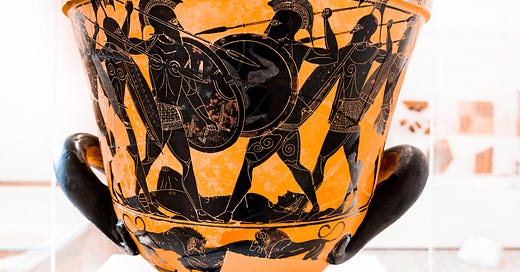I never quite understood why Achilles expressed his anger at the death of Patroclus by dragging the body of Hector behind his chariot and refusing to return it to King Priam. But finally, after reading the aristeia of Patroclus in Book 16, and then the furious fight over his stripped body in Book 17, I think I’m finally getting some idea.
Over and over in the Iliad, we have warriors taunting each other, fighting over bodies, and stripping armor. Sometimes, the corpse is beheaded if the death blow itself did not sever the head from shoulders. I had come to see this as normal, which to some extent it is. But it is a normal method of desecrating the body.
When the soldier whose body is being desecrated is not high ranked, such as Imbrios or Ilioneus, the battle simply continues. It’s just part of the taunts and boasting and jeers. But when someone of high rank is involved, it gets serious. Very serious.
During his aristeia, Patroclus kills Sarpedon, a son of Zeus, and king of the extremely important Lycian ally of Troy. The Trojans fight over his body, but eventually are beaten back and leave it. Patroclus strips the armor and sends it back to the ships. He then calls for Sarpedon to be further dishonored:
May we take him, dishonor him, and strip his arms. Translated by Robert Fitzgerald
And then Hector, as Patroclus dies, boasts:
The kites will feed on you, here on this field. Translated by Robert Fitzgerald
In Book 16, Zeus doesn’t let Sarpedon’s body itself be desecrated. He sends Apollo to clean it, who then sends Death and Sleep take the body back to Lycia for a proper burial.
But Lycian captain, Glaukos, doesn’t seem to know this in Book 17.
He rebukes Hector for standing back from the fight over the stripped body of Patroclus. Why should the Lycians fight for Troy, if Hector is willing to abandon the body of Sarpedon?
So what does fighting for the body of Patroclus have to do with the body of Sarpedon? Because they can trade the body of Patroclus for the body and arms of Sarpedon!
If the Trojans had spirit – had that unshakable will that rightly comes to men who face for their own land the toil and shock of war, we’d pull Patroklos into Ilion quickly! And were he brought in death to the great town of Priam, if we dragged him from the fury, the Argives would return Sarpedon’s arms, his body, too, for us to carry home to Ilion in fair exchange. Translated by Robert Fitzgerald
The Lycians threaten to abandon Troy altogether because the Trojans have lost the body of their king, Sarpedon, and his arms. After all, it’s not their own land and wives they’re fighting for.
Imagine Achilles, learning that Hector has stolen his armor from the body of Patroclus, and threatened to feed his body to the kites, although the Trojans were not successful in that. He, too, like the Lycians, is not fighting for his own land and wife.





These Bronze Age/Dark Age Greece warriors aren't much different from the Vikings. They would talk about carving the 'blood eagle' on their enemies. A brutal indignity to inflict on someone alive or dead. But I'm not surprised. The Romans would ritually execute enemies in public. Public beheadings and burning at the stake were common in the Middle Ages.
Then you get into 'trophies,' which were usually a warriors arms and armor left on display on the battlefield after that enemy was killed in battle. Roman torcs, awarded to legionaries for bravery, came from the torcs worn by Celtic warriors and originally taken from their bodies. Status was fought over for as long as wars and raids have occurred. Go far back enough, and status was gained from stealing livestock, captives for ransom/slavery, and other portable symbols of wealth.
*steps down from his BA in History soap box* 😁